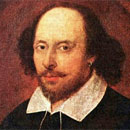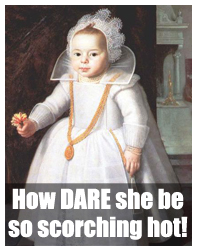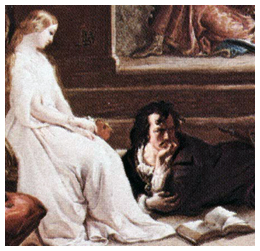6 Reasons Shakespeare Would've Written For Cracked.com

 As a Cracked columnist, I often receive messages asking for help getting started with writing. A lot of folks ask me “what kind of people write for Cracked? Is this really a good way to start my writing career? Aren’t all the Cracked writers just basement-dwelling freaks who watch too much SciFi Channel?”
Well, to them I answer thusly: First, screw you; you sound like a dick. Second, if William Shakespeare were alive today, he would write for one site and one site only: Cracked.com.
OK, he might occasionally put something up on McSweeny’s
, but just the real pretentious stuff. There’s no question that our hallowed halls would be the preferred stomping grounds of The Great Bard, and here’s why.
As a Cracked columnist, I often receive messages asking for help getting started with writing. A lot of folks ask me “what kind of people write for Cracked? Is this really a good way to start my writing career? Aren’t all the Cracked writers just basement-dwelling freaks who watch too much SciFi Channel?”
Well, to them I answer thusly: First, screw you; you sound like a dick. Second, if William Shakespeare were alive today, he would write for one site and one site only: Cracked.com.
OK, he might occasionally put something up on McSweeny’s
, but just the real pretentious stuff. There’s no question that our hallowed halls would be the preferred stomping grounds of The Great Bard, and here’s why.
He Was A Critical Analyzer Of Pop Culture
Shakespeare’s plays and poems are full of commentaries on what was going on in England at the time. When the Puritans started publicly complaining about his plays featuring love between men and young boys (who played the female roles) and arousing the audience to “retreat to secret conclaves and there play the Sodomite, or worse,” Shakespeare responded by writing Measure for Measure, a play about a Puritanical Duke who tries to outlaw all sexual misconduct to stifle his own sick urges towards a nun. Kind of a “he who smelt it dealt it” response, but effective nonetheless. And not unfounded, especially when you consider the words of a Puritan of the time decrying pedophiles while at the same time giving a perfect impression of one:
And not unfounded, especially when you consider the words of a Puritan of the time decrying pedophiles while at the same time giving a perfect impression of one:
“These pretty upstart youths profane the Lord’s day by the lascivious writhing of their tender limbs and gorgeous decking of their apparel…”
“How dare these sexy children be so damned sexy, wiggling like that, it’s…it’s…I mean come on!”
Shakespeare also openly mocked celebrities of the day, and even included them as characters in his plays. For example, the Bishop of Westchester, featured in King Henry VI, Part I, is satirized for hypocritically making a fortune in prostitution while simultaneously seeking cures for his rampant and numerous venereal diseases. Well, not only was that a real guy, he was also the guy who licensed Shakespeare’s theaterHe Worked In The Bad Part Of Town
Shakespeare worked primarily in two playhouses: The Rose and The Globe. The Rose was literally a brothel with a theater attached, and both places were situated in a nasty part of London called Bankside, Southwark. Southwark was known for two things: being south of Wark, and whorehouses. And we’re not talking about respectable whorehouses here, either; these were places with names like “Ye Olde Fuck Shack” and “Baldric’s Palace of XXX Arse Drilling,” where you could buy a quickie with a man, woman or child for less than the cost of the mercury treatment you’d use to try and rid yourself of the ensuing syphilis.
There was even a whorehouse called “The Cardinal’s Hat” (as in “what the head of a penis looks like”) a mere block away from the Globe, where theatergoers could unwind during intermission by discussing the racy double entendre in the Second Act with the object of their boning. Excepting of course when their mouths were full.
As for the “Bankside” part of the Globe’s address, it referred to the bank of the Thames River. In those days, the Thames did double duty as London’s water supply and main sewer line.
Yes, the first-ever performance of King Lear
And we’re not talking about respectable whorehouses here, either; these were places with names like “Ye Olde Fuck Shack” and “Baldric’s Palace of XXX Arse Drilling,” where you could buy a quickie with a man, woman or child for less than the cost of the mercury treatment you’d use to try and rid yourself of the ensuing syphilis.
There was even a whorehouse called “The Cardinal’s Hat” (as in “what the head of a penis looks like”) a mere block away from the Globe, where theatergoers could unwind during intermission by discussing the racy double entendre in the Second Act with the object of their boning. Excepting of course when their mouths were full.
As for the “Bankside” part of the Globe’s address, it referred to the bank of the Thames River. In those days, the Thames did double duty as London’s water supply and main sewer line.
Yes, the first-ever performance of King LearHe Wrote Almost Nothing Original
Although he freely altered plot specifics and character traits, nearly every single Shakespeare play is essentially a remake of a poem, book or play Will took a fancy to. Othello? Cinthio’s Hecatommithi. The Merchant of Venice? Giovanni Fiorentino’s Il Pecorone meets Richard Robinson’s Gesta Romanarum. Richard III? Basically just Richard II with a wacky ethnic sidekick. Hamlet? The Lion King. Sometimes he didn’t even bother changing the title. Romeo and Juliet
Sometimes he didn’t even bother changing the title. Romeo and JulietHe Made Up Words
Today, most college graduates have a vocabulary of between 3,000 and 4,000 words. Judging from his plays and poems, Shakespeare’s was around 29,000. Of course, historians still debate about whether he in fact wrote all the plays credited to him, so the total might be somewhat inflated. But really, does it make that much of a difference? Cut 29,000 in half, then cut that in half, and he’s still way out of your league. The man ate dictionaries and shit thesauri (a word he probably invented). How’d he do it? Well, first off, he didn’t do much else; he was one of the most prolific authors of his era. And secondly, it’s hard to know more words than a guy who freely makes them up whenever he wants.
As I’ve mentioned before, ol’ Shakey coined so many household words and phrases, you basically can’t talk without ripping him off. In fact, he invented the phrase “household words,” so I think I owe him a farthing or something.
Wait a minute. Who else makes up words with abandon? What other orgasmtastic group of blogsmiths dares to so refunkify the English lizzanguage? Why, could it be—Ye Gods, look out! There’s a Chompapottamus headed straight for you!
Further Reading:
How’d he do it? Well, first off, he didn’t do much else; he was one of the most prolific authors of his era. And secondly, it’s hard to know more words than a guy who freely makes them up whenever he wants.
As I’ve mentioned before, ol’ Shakey coined so many household words and phrases, you basically can’t talk without ripping him off. In fact, he invented the phrase “household words,” so I think I owe him a farthing or something.
Wait a minute. Who else makes up words with abandon? What other orgasmtastic group of blogsmiths dares to so refunkify the English lizzanguage? Why, could it be—Ye Gods, look out! There’s a Chompapottamus headed straight for you!
Further Reading:He Loved Dick Jokes
The one thing all Cracked authors must have in common is a deep and abiding love of a good dick joke. In fact, the only component of the hiring interview is an Editor calling you in the middle of the night and saying “floppy penises” when you pick up. If you giggle, you’ve got the job. And there’s absolutely no question that Shakespeare loved the dick joke. Although they often fly over the heads of modern audiences, every single thing Shakespeare ever wrote is like 30 percent puns on the word “balls.” I’m serious. The guy wrote about dicks, vaginas, boning, butt sex, gays, lesbians, cunilingus, pubes and sperm so much I wouldn’t be surprised if the quill he wrote with had a pair of rubber novelty testicles hanging off it. A single example will suffice. People who get off on the fact that the foundation of western literature was a pervy old man love to cite this part of Hamlet, and while it is particularly awesome in its skeeviness, it’s by no means an anomaly. It goes like this:
Hamlet: Lady, shall I lie in your lap?
Ophelia: No, my lord.
Hamlet: I mean my head upon your lap?
Ophelia: Ay, my lord.
Hamlet: Do you think I meant country matters?
Ophelia: I think nothing my lord.
Hamlet: That’s a fair thought to lie between maid’s legs.
Ophelia: What is, my lord?
Hamlet: No thing.
Ophelia: You are merry, my lord.
On first look, it seems like a simple and pretty boring misunderstanding about whether Ophelia will let Hamlet lay his head in her lap while they watch a play. But take into account the fact that in Elizabethan England, “nothing” was slang for vagina (because it’s shaped like an “O”), “thing” was slang for dick, “head” meant tip of the penis, “merry” meant sexually aroused and “country matters” was taken to mean “matters pertaining to the cunt,” and you get this much more interesting exchange:Hamlet: Hey, can I stick my wangle in your pooter?

Ophelia: Seriously? Your mom’s like, right over there.
Hamlet: What if I just put the tip in?
Ophelia: Very well, my lord.
Hamlet: You get it? I’m talking about your cunt.
Ophelia: Yeah, I kind of picked up on that. I’m too am thinking about vaginas.
Hamlet: That’s a good thing to do between a lady’s legs. Fuck vaginas, I mean.
Ophelia: What is, my lord?
Hamlet: Vagina penis.
Ophelia: Correct me if I’m wrong, but you seem horny, my lord.
I don’t care how many black dinguses Lisa Lampanelli crams into her capacious vagina, she’s not getting any filthier than that. Add to all this the fact that, in his time, William Shakespeare's name can be taken to mean "Penis Masturbation" and you've got yourself the reigning champion of genital references. Further Reading:He Was Considered “Low Art” Until After His Death, When His Genius Was Finally Recognized By More Enlightened Generations
Shakespeare wasn’t always treated with the respect, reverence and enthusiasm high school English students lavish on him today (yes, I live in a fantasy world). In his time, a large segment of England’s population considered theater in general to be repugnant, and a “gateway drug” to all manner of other vices, from atypical sexuality to questioning the leaders who condemn you to live in shit and tax half your income. Pamphlets were released calling for the destruction of the Globe, with titles like “Theatre Is Sin” and “Free Sex! Now That I’ve Got Your Attention, Theatre Is Sin.” Some even accused Shakespeare himself of fraternizing with the young boys who served as actors in the shows. These pamphlets are widely considered to be the world’s first “yur a fag” comment, something Cracked writers are intimately familiar with. In fact, plays were so looked down upon as a form of literature that Shakespeare’s weren’t published in an official volume until long after his death. Until then, all you could get were pirated copies written down by fans during the show and sold in booths at the flea market. It was kind of like the BitTorrent of the 1600’s.
When not comparing himself to the greatest writer who ever lived, Michael serves as head writer and co-founder of Ye Olde Those Aren't Muskets!